Archimedes From Syracuse – Master Of Science Whose Legacy Still Remains Powerful
A. Sutherland - AncientPages.com - He has been considered a genius with the highest mental ability and unique talent. Who was Archimedes?
 Statue of Archimedes of bronze created by Gerhard Thieme (1972) . Image credit: Spree Tom - CC BY-SA 3.0
Statue of Archimedes of bronze created by Gerhard Thieme (1972) . Image credit: Spree Tom - CC BY-SA 3.0
Archimedes was a great scholar from Syracuse, the ancient capital of Sicily, which was originally a Greek colony founded by Corinth in 734 BC.
Not much is known about Archimedes, and information about him comes only from the introduction of his works and from numerous anecdotes often quoted by ancient historians.
He was the son of Fidias, an unknown astronomer about whom nothing is known. Even the year of Archimedes' birth (probably about 287 BC) has never been established with absolute certainty.
Plutarch reports that Archimedes' family was in some way related to that of Hieron II, King of Syracuse (c. 306 BC - 216/215 BC), the Greek Sicilian Tyrant of Syracuse.
It is believed that he was killed in 212 BC during the Roman conquest of Syracuse.
It was Hieron who asked the scholar to check - whether the goldsmith performing the crown for the tyrant did not replace the gold with… silver.
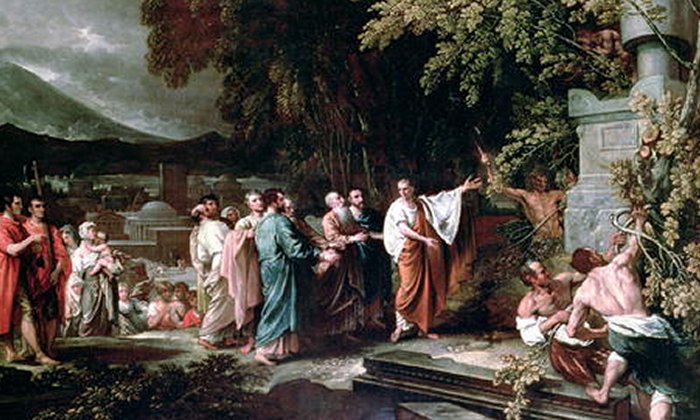 Cicero and the magistrates discovering the tomb of Archimedes in Syracuse , by Benjamin West (1797). Image credit: Benjamin West -Bridgeman Art Library - Public domain
Cicero and the magistrates discovering the tomb of Archimedes in Syracuse , by Benjamin West (1797). Image credit: Benjamin West -Bridgeman Art Library - Public domain
In an experiment about floating and sinking, known today as "Archimedes' principle", the Greek mathematician and philosopher Archimedes quickly found out (maybe by chance or perhaps not) that "when an object is immersed in a liquid, the upthrust (a force that a liquid or gas exerts on a body floating in it) - is equal to the weight of the liquid displaced by the object."
The sage discovered the hydrostatic law of buoyancy while bathing and playing with a rubber duck and a plastic boat. He ran out into the streets of Syracuse, screaming, "Eureka!" which means "I found." He probably did not even notice that he was naked, and on his way to the ruler, he informed him that he was, in fact – deceived.
Archimedes of Syracuse. Image credit: Domenico Fetti - Public Domain
Thus, the great man became known to the city's inhabitants not only as a brilliant scholar but also as an exhibitionist.
His intellectual potential was also attested during the Syracuse war with the Romans when he prepared the defense of his hometown. He built many gigantic war machines with catapults at the head, not only feared by the land forces but also by the maritime forces of Rome. He also created powerful "iron hands" cranes that captured Roman ships and overturned them. The Syracuse warriors drowned many gigantic boulders, thrown off by the arched arms constructed by Archimedes.
However, his most intriguing invention was the famous Burning Mirrors, by which Syracuse set fire to Roman ships. It was a remarkable design of the master and is dated to about 2200 years.
In this way, Syracuse could hold out for three years against an extended Roman siege.
His famous Syracusean planetarium enabled him to observe the motion of all celestial objects, visible from the motion of the planets to the eclipses of the Moon and Sun. Archimedes first invented methods for determining solids' fields, volume and surface and contributed to knowledge regarding at least three of the five simple machines such as winch, pulley, lever, wedge, and screw—known to antiquity.
At the end of 212 BC, his city of Syracuse finally died. During the robbery of the city by the Romans, the great Archimedes was murdered by one of the Roman legionaries.
Plutarch himself cited different versions of his death. One of them seems most likely; Archimedes was killed by a Roman soldier, no doubt as retribution when Rome took Syracuse.
It does not matter which version is genuine. The fact is that he was murdered with the fall of the city of Syracuse. Apparently, on this great man's gravestone, a cylinder drawing was carved, describing on a ball with the signature that the volume ratio of these bodies was 3: 2.
Thus, Archimedes wanted to capture his most outstanding achievement, as he wrote in his last will.
Where is the grave of this remarkable ancient scientist? According to legend, Archimedes is buried at the Necropolis Grotticelli, an ancient burial road in the Archaeological Park of Syracuse. Other locations were also suggested, and its real location is unknown.
The last mention of him comes from the records of Cicero, who was to visit Archimedes' resting place. Later the grave was certainly forgotten and left unattended.
Thus, after Archimedes, only the achievements of his mind remained to this very day.
Updated on February 4, 2023
Written by – A. Sutherland AncientPages.com Staff Writer
Copyright © AncientPages.com All rights reserved. This material may not be published, broadcast, rewritten or redistributed in whole or part without the express written permission of AncientPages.com
Expand for referencesReferences:
Lafferty, P. Archimedes
Paipetis, S. A., Ceccarelli, M., The Genius of Archimedes
More From Ancient Pages
-
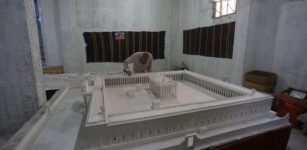 Memory Of Palmyra’s Ancient Ruins Preserved Thanks To One Man’s Dedication And Mini Models Of Lost Temples
Archaeology | Mar 24, 2021
Memory Of Palmyra’s Ancient Ruins Preserved Thanks To One Man’s Dedication And Mini Models Of Lost Temples
Archaeology | Mar 24, 2021 -
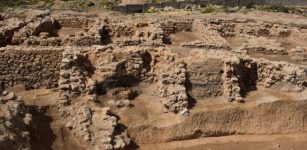 Ancient Greco-Roman Amphora Workshop Discovered In Alexandria, Egypt
Archaeology | Apr 17, 2022
Ancient Greco-Roman Amphora Workshop Discovered In Alexandria, Egypt
Archaeology | Apr 17, 2022 -
 Underwater Archaeologists Retrieve Over 100 Magnificent Glass Objects at Chengene Skele Bay, Bulgaria
Archaeology | Jul 16, 2024
Underwater Archaeologists Retrieve Over 100 Magnificent Glass Objects at Chengene Skele Bay, Bulgaria
Archaeology | Jul 16, 2024 -
 On This Day In History: Supernova Observed In Constellation Lupus By Chinese And Egyptians – On May 1, 1006 AD
News | May 1, 2016
On This Day In History: Supernova Observed In Constellation Lupus By Chinese And Egyptians – On May 1, 1006 AD
News | May 1, 2016 -
 Cosmic Impact 12,800 Years Ago Forced Hunter-Gatherers In The Levant To Adopt Agricultural Practices
Archaeology | Oct 4, 2023
Cosmic Impact 12,800 Years Ago Forced Hunter-Gatherers In The Levant To Adopt Agricultural Practices
Archaeology | Oct 4, 2023 -
 Merovingian Dynasty Of Long Haired Kings
Featured Stories | Jan 18, 2019
Merovingian Dynasty Of Long Haired Kings
Featured Stories | Jan 18, 2019 -
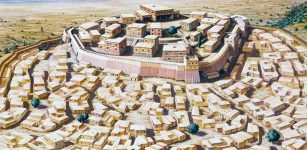 Ancient City Of Troy Was Destroyed By An Earthquake That Ended The Trojan War – Archaeologists Say
Archaeology | Jun 14, 2017
Ancient City Of Troy Was Destroyed By An Earthquake That Ended The Trojan War – Archaeologists Say
Archaeology | Jun 14, 2017 -
 5,000-Year-Old Underground Partly Submerged City Discovered In Turkey’s Cappadocia
Archaeology | Jun 10, 2019
5,000-Year-Old Underground Partly Submerged City Discovered In Turkey’s Cappadocia
Archaeology | Jun 10, 2019 -
 Pax Romana: 200-Year-Long Period Of Stability Within The Roman Empire
Ancient History Facts | Apr 19, 2016
Pax Romana: 200-Year-Long Period Of Stability Within The Roman Empire
Ancient History Facts | Apr 19, 2016 -
 Monster Water God Gong Gong Blamed For Cosmic Catastrophes In Chinese Myths
Chinese Mythology | Nov 2, 2020
Monster Water God Gong Gong Blamed For Cosmic Catastrophes In Chinese Myths
Chinese Mythology | Nov 2, 2020 -
 Princess Mkabayi KaJama: Condemned And Hated Zulu Kingmaker Who Died A Lonely Woman
Featured Stories | Mar 20, 2019
Princess Mkabayi KaJama: Condemned And Hated Zulu Kingmaker Who Died A Lonely Woman
Featured Stories | Mar 20, 2019 -
 Bryggen Inscriptions Reveal Viking Runes Were Used As Modern SMS – Short Message Service In The Norse World Was Popular
Vikings | Apr 16, 2025
Bryggen Inscriptions Reveal Viking Runes Were Used As Modern SMS – Short Message Service In The Norse World Was Popular
Vikings | Apr 16, 2025 -
 New Study Challenges The Beginning Of Civilization
Archaeology | Apr 11, 2022
New Study Challenges The Beginning Of Civilization
Archaeology | Apr 11, 2022 -
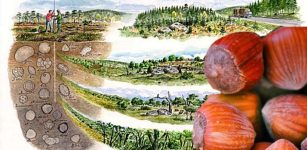 Hazelnuts -‘Time Capsule’ To Reconstruct Landscape Of Ancient Forests In Sweden
Archaeology | Mar 5, 2024
Hazelnuts -‘Time Capsule’ To Reconstruct Landscape Of Ancient Forests In Sweden
Archaeology | Mar 5, 2024 -
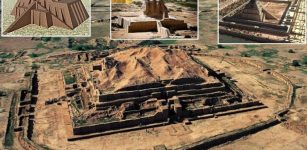 Ziggurats, Axis Mundi And Strong Connection To Religion In Mesopotamia
Featured Stories | Mar 17, 2021
Ziggurats, Axis Mundi And Strong Connection To Religion In Mesopotamia
Featured Stories | Mar 17, 2021 -
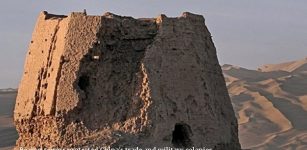 Nine Great Wall Beacon Towers Discovered In China’s Inner Mongolia
Archaeology | Apr 21, 2020
Nine Great Wall Beacon Towers Discovered In China’s Inner Mongolia
Archaeology | Apr 21, 2020 -
 Mysterious Underground City In Brazil Could Re-Write Ancient History – Riddle Of The 12 Men – Part 2
Ancient Mysteries | Jan 26, 2022
Mysterious Underground City In Brazil Could Re-Write Ancient History – Riddle Of The 12 Men – Part 2
Ancient Mysteries | Jan 26, 2022 -
 Grave Of Scythian Amazon Warrior Wearing A Golden Ceremonial Headdress Discovered In Voronezh, Russia
Archaeology | Dec 8, 2019
Grave Of Scythian Amazon Warrior Wearing A Golden Ceremonial Headdress Discovered In Voronezh, Russia
Archaeology | Dec 8, 2019 -
 Samurai Swords: Katana And Wakizashi And Their Long Tradition
Ancient Traditions And Customs | Aug 6, 2018
Samurai Swords: Katana And Wakizashi And Their Long Tradition
Ancient Traditions And Customs | Aug 6, 2018 -
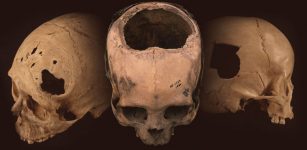 Ancient Peru’s Cranial Surgeons Had Remarkable Skills
Ancient Technology | Jun 8, 2018
Ancient Peru’s Cranial Surgeons Had Remarkable Skills
Ancient Technology | Jun 8, 2018


